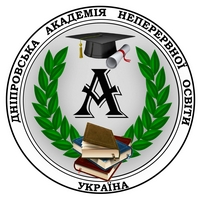SYNERGETIC METHODOLOGY IN THE MANAGEMENT OF DUAL LEARNING
Abstract
Summary. The article considers the requirements for education, which orient the teacher to the use of tools adequate
to the level of development of modern technologies of dual education and which meet the needs of the beginning of the
XXI century.
The research is devoted to the philosophical understanding of the transition to the introduction of synergetic
methodology for managing educational processes. Without substituting general pedagogical, psychological, cultural
bases and educational concepts, philosophy, as a systemic vision of the problems and prospects of educational
development, must first consider the fundamental worldview demands. In this context, the application of synergetics
and synergetic approach is raised, which successfully reflect the different levels of consideration of the applicability and
interaction of dual learning and the current state of education. It is proposed to use synergetics both in education itself,
for educational purposes, and to use the synergy of the educational process itself.
The publication, through the prism of philosophy, attempts to identify and rethink the results of research on the nature
of the use of synergetic methodology in relation to educational processes in the management of dual learning. The article
proves that educational synergetics applies universal characteristics of self-organized systems for dual learning.
References
1. Андреева Н. В., Рождественская Л.В., Ярмахов Б.Б. Шаг школы в смешанное обучение. М. : Буки Веди, 2016. 282 с.
2. Бим-Бад Б. М. Антропологическое основание теории и практики современного образования. Очерк проблем и
методов их решения. М., 1994. 160 с.
3. Буданов В. Г. Трансдисциплинарное образование, технологии и принципы синергетики. Синергетическая парадигма :
Многообразие поисков и подходов. М. : Прогресс-Традиция, 2000. С. 285-304.
4. Гершунский Б. С. Философия образования. М., 1998. 65 с.
5. Дернова М. Г. Дуальна модель вищої професійної освіти дорослих : європейський досвід. Освіта дорослих : теорія,
досвід, перспективи. Випуск 2 (9). 2014. С. 137-145.
6. Ершова-Бабенко И. В. Психосинергетика в контексте истории развития синергетики. Практична філософія. 2003.
№ 3. С. 161-174.
7. Іонан В. Цифрова компетентність. Які навички слід розвивати під час пандемії. URL : https://nv.ua/ukr/opinion/
distanciyna-robota-yak-adaptuvati-ukrajinciv-do-novih-realiy-novini-ukrajini-50158264.html (дата звернення : 16.12.2021).
8. Каган М. С. Формирование личности как синергетический процесс. Синергетическая парадигма. Человек и общество
в условиях нестабильности. М. : Прогресс-Традиция, 2003. С. 224-225.
9. Князева Е. Н., Курдюмов С. П. Основания синергетики. Режимы с обострением, самоорганизация, темпомиры.
СПб. : Алетейя, 2002. 305 с.
10. Розпорядження Кабінету Міністрів України про схвалення документу «Концепція підготовки фахівців за дуальною формою здобуття освіти» від 19.09.2018 № 660-р. URL : https://zakon.rada.gov.ua/laws/show/660-2018-%D1%80#Text
(дата звернення : 16.12.2021).
11. Степин В. С. Саморазвивающиеся системы и постнеклассическая рациональность. Вопросы философии. 2003.
№ 8. С. 5-17.
12. Фолльмер Г. По разные стороны мезокосма. Человек. 1993. № 2. С. 5-11.
13. Bonk, C. J., & Graham, C. R. (Eds.). Handbook of blended learning : Global Perspectives, local designs. San Francisco,
CA : Pfeiffer Publishing. 2006. P. 1-32.

 ISSN
ISSN  ISSN
ISSN 

